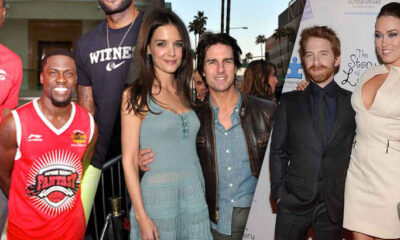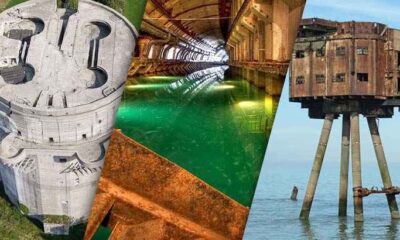TRENDING
Don’t Look Up Review
Published
4 years agoon

2021 | R | 2h 18m
Don’t Look Up is a satirical comedy film about an apocalyptic scenario that threatens the existence of the human race. Director Adam McKay effectively uses the plot as a backdrop to direct discussion and draw attention to the impending climate crisis, seeing as there is little to no media coverage about a potentially disastrous sequence of events that may result in the extinction of all life on Earth. In the film, a “planet-killer” asteroid much like the one that led to the extinction of dinosaurs is on a direct collision course with Earth.
The asteroid is discovered by one of the leads of the film, Kate Dibiasky, a Michigan State University doctoral candidate. Her Professor, Dr. Randall Mindy, while calculating the asteroid’s course, comes to a horrible realization that sets the premise for the rest of the film. The asteroid will hit Earth in approximately six months and is large enough to cause an extinction level event. Both Leonardo Di Caprio and Jennifer Lawrence do an amazing job portraying the shock and fear in their characters once they learn that the event is set in stone. The repeated calculations, the nervous rubbing of hands, the trying to get the authorities on the phone (Yes, there’s a planetary defense office and no it is very real and not dramatized for the purpose of the film) all contribute to developing an almost tangible feeling of tension that sets in the atmosphere throughout the entirety of the film.
The interesting thing about “Don’t Look Up” is that the events that transpire feel very similar. Adam McKay even went as far as to say that he had to change the plot to his film drastically, since when the pandemic happened it felt like the movie was already taking place around him. Upon learning the dreadful nature of the asteroid, both Randall and Kate board a flight to Washington to brief the President about the situation, but are met with a nonchalance that is offensive to them and frustrating to you, the viewer. Meryl Streep, who plays the infuriating president does it so very convincingly. She can hardly care about the science and is very loud in her ignorant views. The decision she ends up making? “Sit tight and assess.” “Would we really be reacting like this in the face of impending doom?” you can’t help but think. However, the timing of the film is very convenient, since you can immediately draw comparison to how governments behaved when they were told to take immediate precautions for Covid-19, and we already know how that unraveled.
Randall and Kate decide to then to take their concerns directly to the public, cutting the middle-man altogether. Scheduled to make an appearance on a famous morning tv show, they fail to make their concerns heard once again. This time their thunder is stolen by a celebrity couple getting back together. Once again there’s a level of frustration that is immediately met by, “oh wait, that’s how the public would react, we have already been through this.”
When the President becomes involved in a sex scandal, she finally decides to give Randall and Kate the time of the day, deeming it wise to distract the public’s attention with the comet. So close and yet so far, in comes the orchestrator of chaos, Peter Isherwell. Played by Mark Rylance, Isherwell channels the spirit of a number of tech tycoons that threaten the planet with their never-ending greed. Almost robotic in his mannerisms, he’s also the mind behind an algorithm that knows every human better than they know themselves. Profit taking precedent over saving the planet, Isherwell and the government collectively decide to mine the asteroid for its rare minerals instead, which have become scarce on Earth.
Afterwards, both Randall and Kate distance themselves from the effort. Kate more so than Randall, who becomes an unwitting proponent of the comet’s commercial opportunities. His character follows an interesting arc. From being the more nervous one in the room to eventually becoming the more collected one. To losing his way in an affair to being given a jolt back into reality by his wife. You can see how withdrawn and jaded both Kate and Randall become due to the public’s attitude towards the doomsday news, each of them finding ways to deal with it in their own way.
When the asteroid does appear in the sky, the public becomes ideologically divided. This leads to the whole “Don’t Look Up” and “Just Look Up” campaigns, with one side advocating for the safe destruction of the comet, and the other side denouncing the exaggerated alarmism. It doesn’t come as a surprise that Isherwell’s efforts to mine the asteroid eventually fail, with President Orlean and the lot boarding a spaceship headed for another planet.
The movie has humongous star power, which can at times feel underused, but it still does not justify the undue criticism the movie has been receiving. The concept, although not completely original, does direct your attention to the problems surrounding climate change and the larger attitudes towards it. Much slower than an asteroid vying to destroy all life on Earth, climate change is still very much real.
Leonardo Di Caprio, as always, does an amazing job capturing the psyche of man who’s just been told that the world is ending. Jennifer Lawrence is a welcome surprise, returning to screen after a long absence, and she compliments Leo’s onscreen energy very well. The movie does have bits where you just wish they would get on with it, but it ultimately doesn’t matter much in the face of the overall experience.
The end of the movie is rather poetic, with the people denying the asteroid’s existence altogether looking up in disbelief, regretting their decisions up until now. In stark contrast with our leads however, with both Kate and Randall holding hands in prayer over dinner looking amongst family and friends.
Rating the Film:
Visuals: 3/5
Plot: 3/5
Characters: 2/5
Music: 3/5
Originality: 3/5
Seater Score: 2.8/5
More Movies + TV Shows
-


Most Dangerous Species On The Planet
-


Most Hilarious Gym Photos
-


The Highest Paid Newscasters On Television
-


Zoe Saldana and Rachel McAdams Hit Red Carpet at CinemaCon
-


TV And Movie Roles That Were Recast
-


Richest Black People In The World
-


Hollywood’s Shortest Men In Entertainment
-


Charli XCX and The Go-Gos Set to Play 80s Crossover…
-


Unscripted Lines That Made Movies Better
-


Amazing Mind-Bending Optical Illusions
-


Brand Names Disguised As Costco’s Kirkland Signature Products
-


Abandoned Top Secret Military Bases

